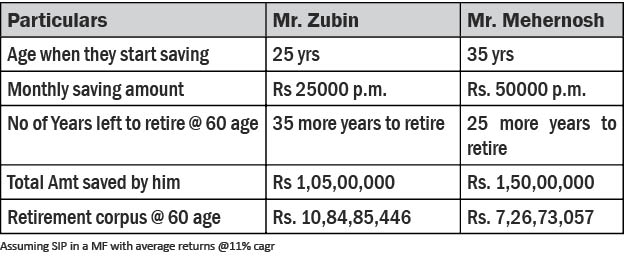Marzee Kerawala is a Certified Financial Planner with expertise in Income Tax and Investment products. Managing assets worth over Rs. 4 Billion, his firm ‘NiveshIndia’, designs Tailored Investment Strategy through Customised Financial Planning for individuals and NRIs, and also handles Treasury Management for corporates and SMEs. You can contact him at +91 9987567667 or Email: marzeek@niveshindia.co.in [Website: www.niveshindia.in]
Financial literacy in India is in state of wanting. Many youngsters graduating from schools and universities have no clue about Money Management as no formal subject or program that teach them Personal Finance. Most parents I talk to face this dilemma of tackling financial issues with their young adults. The challenge is to tackle these issues without friction. In case you are a parent with children in their mid-20s, this article is for you. It will explain things which we weren’t taught about in our youth, and will make a huge impact their lives, going forward…
Power Of Compounding: Youngsters are potentially the richest amongst us all – they have the most important factor of wealth creation by their side – TIME. “Compound interest is the eighth wonder of the world – he who understands it, earns it. He who doesn’t, pays it!” Einstein reportedly said. This may be one of the most important lessons you can teach your young children. Even if the savings are small, with the power of compounding, the wealth created by a youngster can be enormous. Let us understand this with the help of an example.

In the above e.g. Zubin starts saving Rs. 25,000 pm from the early age of 25 years. With 35 more years to retire, the total saved by him is Rs 25000 x 12 months x 35 years = 1.05 Cr, while Mehernosh has a mind set to enjoy life for now and start saving at a later age when he will earn more money. He thinks he will compensate this late start by saving double the amount which Zubin saves all through till his retirement. Now the total amount saved by Mehernosh is almost 50% higher than Zubin i.e. Rs 50,000 x 12 months x 25 years = 1.50Cr. But still Zubin ends up with a retirement kitty of Rs 10.84Crs v/s Rs 7.26 Cr by Mehernosh. Having time on your side is very advantageous. Some youngsters ignore this valuable input and miss out at their own risk.
Control Spending: A famous saying by Bo Derek, goes, “Whoever said money can’t buy happiness, simply didn’t know where to go shopping.” When young adults make new friends and become a part of new groups, there is an increase in expenses – be it on dining, gadgets, clothes, accessories or entertainment and holidays. Surely, they must enjoy life, but they need to understand the basic difference between necessities and luxuries as well. As parents, we need to monitor their urge to splurge; give them a fixed amount of monthly pocket money and not bail them out if they end up broke before the month end. As parents, it’s important not to fall for their emotional manipulation!
Peer Pressure: It’s important to monitor the peer group in which your child(ren) move(s). Peer pressure is common at this age and they will want to keep up with their friends and their lifestyles. This could result in financial distress as well as emotional / psychological issues. You need to ensure they do not fall prey to superiority or inferiority complex.
Dangers Of Debt Traps: This could include impulsive buying gadgets online through credit cards or lending to friends. Armed with credit cards in their wallets, shopping gives a high to many youngsters – known as emotional buying – a major part of current spending. Avoid giving teenagers credit cards who have displayed irresponsible financial behaviour. If they’ve lent money to friends, make it clear that they alone would be responsible for the timely recovery of the same. At the same time, ensure to encourage them to help people around us, like our security guards, maids, driver, car cleaners etc.
Ultimately, as a parent, your mind-set, habits and financial behaviour will influence them the most. So be cautious that you do not rub them with your financial fallacies, investment ignorance or shopping addictions. Experience has shown that wise decisions and discipline, during these formative years, make all the difference in securing a better financial future.
- Myths And Facts About Therapy - 18 June2022
- Nominee V/s Legal Heir: Who Wins? - 18 September2021
- Importance Of Successive Nomination During The Pandemic - 19 June2021
